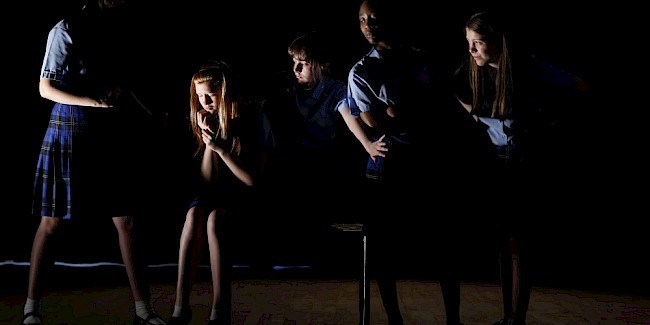Key Stage 5 Drama
Curriculum Overview
Students at Key Stage follow the IB Theatre course as part of the IB Diploma.
| | Term 1 | Term 2 | Term 3 | Term 4 | Term 5 | Term 6 |
|---|
| Year 12 | Political Theatre – Boal, Pinter and Brecht | Berkoff, Stanislavski and Physical Theatre | Technical theatre and Design and Introduction to Solo Project | Production Proposal Introduction | Devising and mock collaborative project | Production Proposal Completion |
| Year 13 | Collaborative Project Devising Process | Collaborative Project and Solo Project Performances | Research Presentation Preparation | Research Presentation Performances | | |
Year 12
In Year 12 Students explore the work of a range of theatrical practitioners, including Boal, Berkoff, Stanislavski and Pinter. We will explore topics including political theatre, and work with both devising and text based stimulus. Additionally, students will gain knowledge and confidence with various technical and design elements, including set design, lighting, props and costume. Students will also work both independently and as part of a larger group, gaining experience of both performance and presenting.
One assessment unit will also be completed this year, the Production Proposal. This requires students to select a text and develop their own directorial vision.
In addition, throughout both Year 12 and 13, we will go on several theatre trips to enable students to see a wide range of theatrical styles. Students will also work with theatre practitioners, such as Splendid Productions.
Year 13
In Year 13 students are able to build upon the knowledge gained in Year 12, starting with a ‘Collaborative Project’, through which students devise a piece of theatre and produce a written project which outlines the research, development and evaluation stages of the project.
Students will also produce and deliver a presentation which teaches other members of the class about a world theatre tradition. This presentation enables them to research a new and interesting aspect of theatre and demonstrate practically how an element of their chosen theatrical style can be applied.
Students at Higher Level will also produce a ‘solo project’, which can be geared towards their chosen area of interest. In the past this has included Stanislavski inspired performances, creation of puppetry inspired by Julie Taymor, and video projection work inspired by Robert Lepage. This project is started in Year 12 and completed in Year 13, culminating in a final performance and written coursework project.
Assessment at IB
The Theatre course is an incredibly varied and enjoyable course which is 100% coursework and performance based. There is no written examination on the Theatre course. Students can tailor the course towards their areas of interest and enjoyment.
- Task 1: Solo theatre piece (HL only) N/A SL 35% HL
Students at HL research a theatre theorist they have not previously studied, identify an aspect(s) of their theory and create and present a solo theatre piece (4–7 minutes) based on this aspect(s) of theory. Students also produce a 2500 word written report to accompany the performance.
- Task 2: Production Proposal (SL and HL) 30% SL 20% HL
Students at SL and HL choose a published play text they have not previously studied and develop ideas regarding how it could be staged for an audience.
- Task 3: Research presentation (SL and HL) 30% SL 20% HL
Students at SL and HL plan and deliver an individual presentation (15 minutes maximum) to their peers in which they provide evidence of their academic and practical exploration and learning of a world theatre tradition they have not previously studied.
- Task 4: Collaborative project (SL and HL) 40% SL 25% HL
Students at SL and HL collaboratively create and present an original piece of theatre (lasting 7–10 minutes) for and to a specified target audience, created from a starting point of their choice. This performance is supported by a 10 page (maximum 4000 word) project report.
Further Reading/Resources
- The same monologue performed in 5 different practitioner approaches can be viewed here, and is an interesting way to compare performance styles https://www.youtube.com/playlist?list=PL5DE67813461897E6
- An insight into life behind the scenes whilst a performance is on at the National Theatre can be seen here https://www.youtube.com/watch?v=tFj4sOHAfVU
- Wider reading of plays and theory books, including information on a wide range of theatre practitioners, is always recommended, we have a wide selection in the Drama department which students may borrow and we encourage students to join their local library to access even more.
British Values:
British Values in Drama
Democracy: Democracy is explored through the study of Brecht at KS3, 4 and 5. Brecht is a theatre practitioner who presents political and social injustices, including the restriction of liberties based on age, gender, religion, class etc.
Individual Liberty: Students look at fictional and real life examples of those who have stood up for their beliefs, this includes exploring Rosa Parks in KS3. At KS3, 4 and 5 students explore the theatre practitioner Brecht, who highlights political messages through his work – students develop their own theatre to highlight social injustices in their own lives. At KS5 students also explore the practitioner Boal, who explores political oppression through theatre.
Mutual respect: Respect is explored through the sharing of ideas and opinions when devising theatre. This is particularly evident when studying Brecht at all key stages.
Tolerance of those of different faiths and beliefs: All theatre lessons at KS3, 4 and 5 enable students to express their views through both performance and discussion on a range of issues. Students frequently draw on their own experiences within devised role plays in all year groups.



